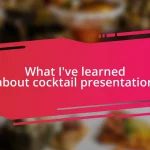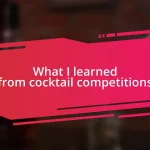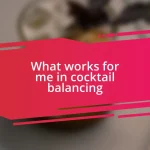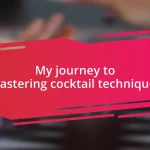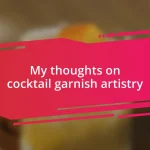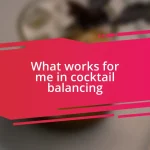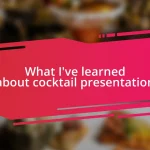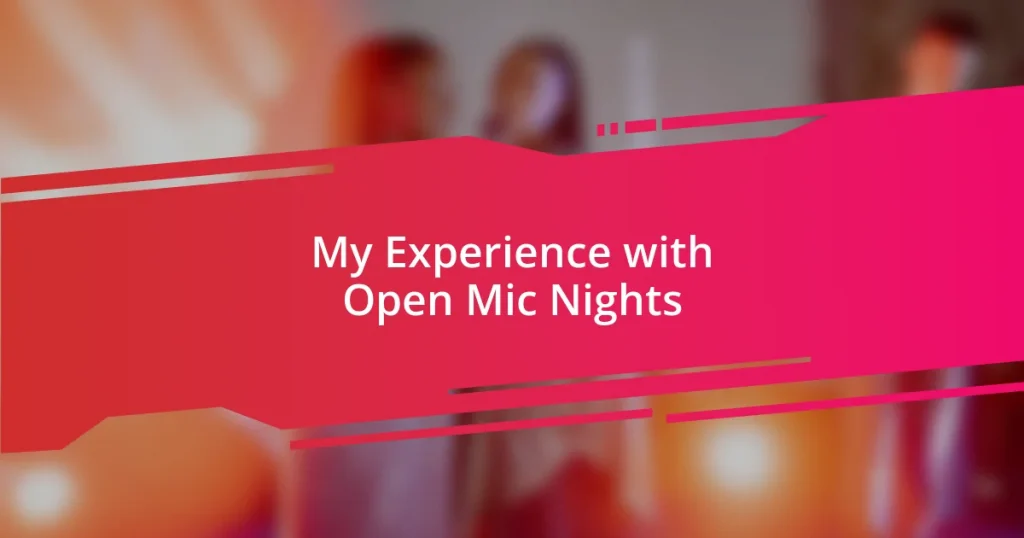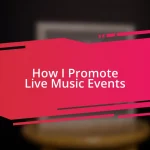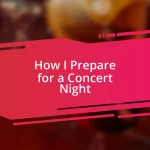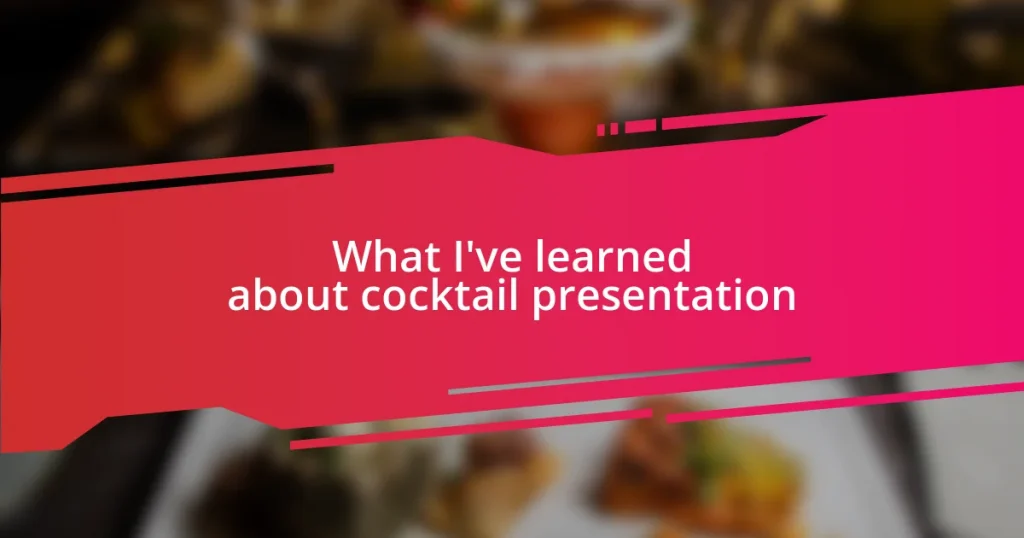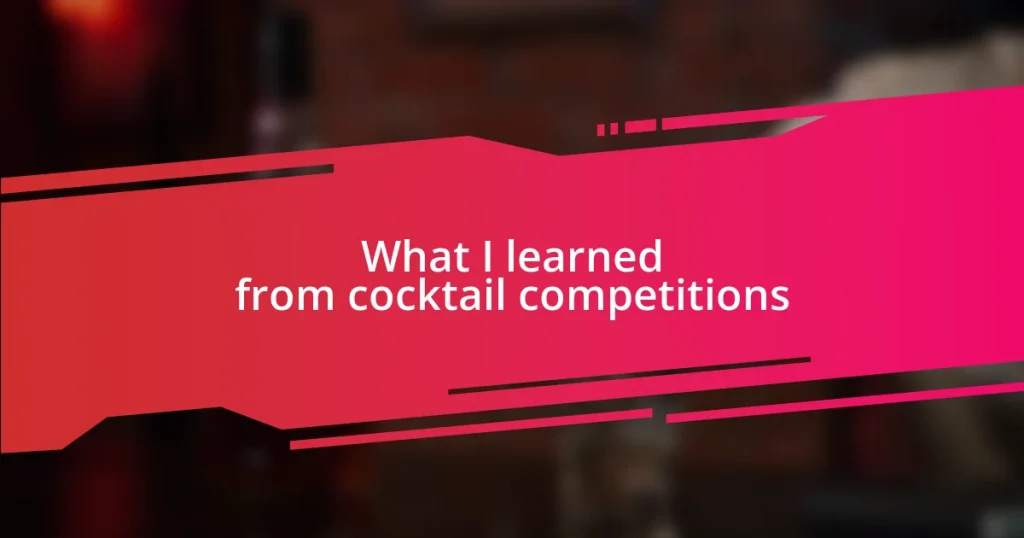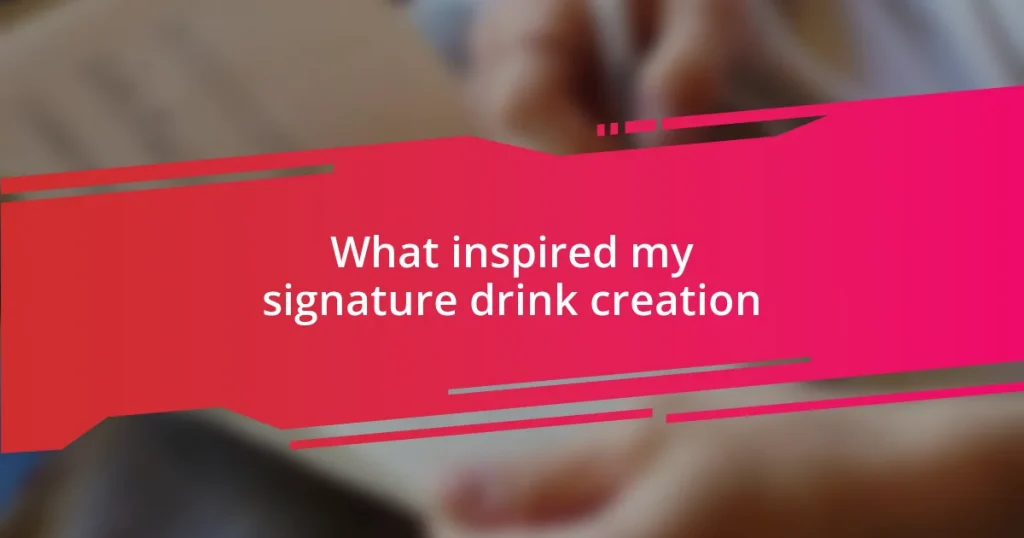Key takeaways:
- Open mic nights serve as vital platforms for artists to express themselves, creating a sense of community and connection among performers and the audience.
- Preparation is crucial for a successful performance; choosing the right material and managing performance anxiety can significantly enhance the experience.
- Engaging with the audience fosters a memorable atmosphere; incorporating improvisation and shared stories strengthens the bond between performer and crowd.
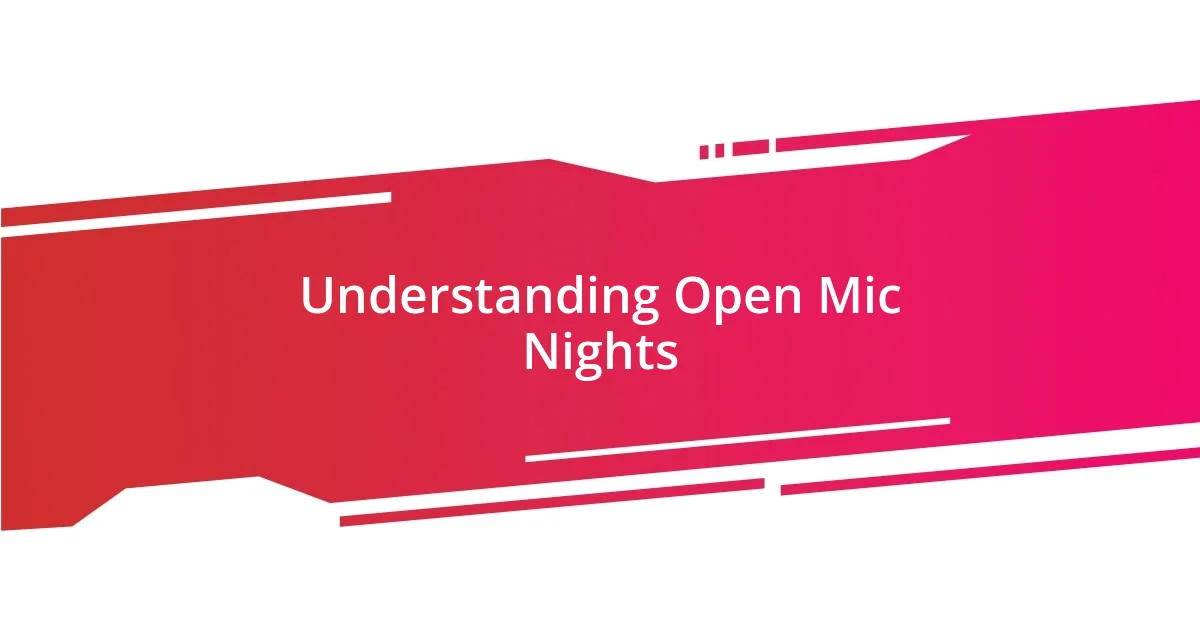
Understanding Open Mic Nights
Open mic nights offer a unique platform for artists to showcase their talents, whether they are musicians, poets, or comedians. I still remember the first time I stepped onto a stage, heart racing and palms sweaty, thinking, “What if nobody claps?” That rush of vulnerability is what makes these events so captivating—they’re filled with both fear and exhilaration.
Each open mic night is a tapestry of diverse voices and styles, and it’s fascinating to see how participants each bring their own flavor. I’ve witnessed a shy singer transform into a powerhouse, pouring their heart into a song, leaving the audience in awe. Have you ever felt that connection in a room full of strangers, where everyone is rooting for each performer? It’s a beautiful reminder of the power of art to unite us.
While the atmosphere can be electric, there’s also a palpable sense of encouragement that envelops the room. On one occasion, a spoken word artist poignantly shared their struggles with anxiety, and you could feel the collective breath of the audience as we all empathized. It’s moments like these that highlight the importance of open mic nights—they’re not just performance events, but safe spaces for self-expression and connection.
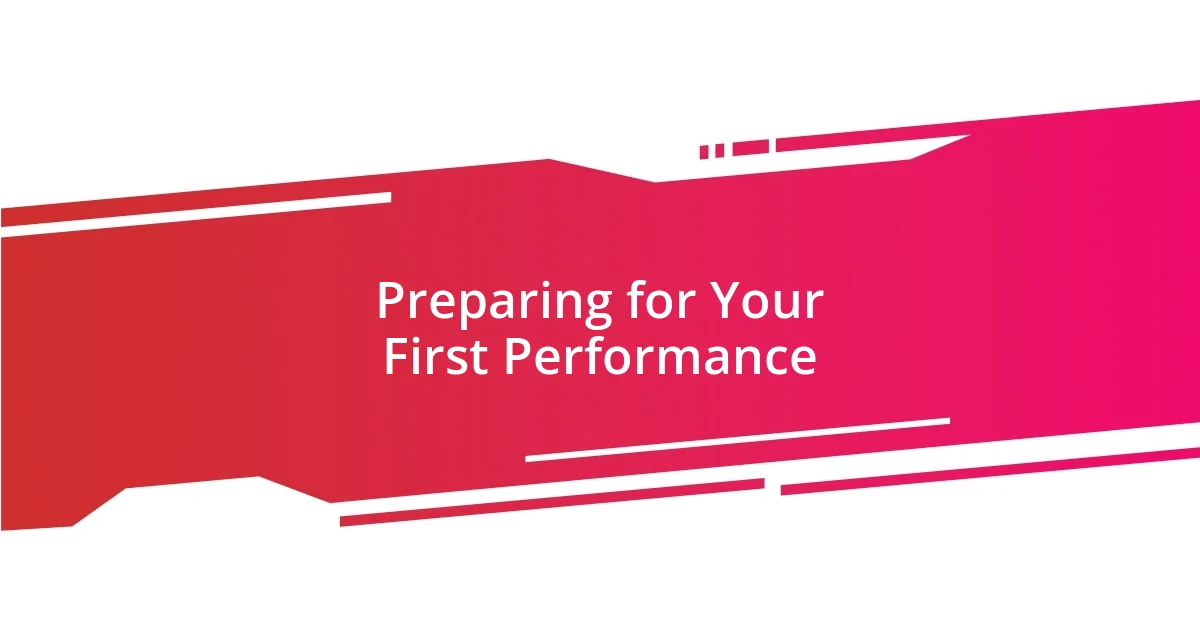
Preparing for Your First Performance
Preparing for your first performance can feel daunting, but leaning into that nervous energy is completely normal. I remember practicing my set late at night, the lyrics of my song etched in my mind like a mantra. What helped me most was writing everything down—lyrics, notes, and even a quick reminder to breathe! This approach not only boosted my confidence but also made me feel prepared for whatever might happen on stage.
Here are some practical tips to help you get ready:
- Choose Your Material Wisely: Pick pieces that resonate with you and showcase your strengths.
- Rehearse with Purpose: Practice in a comfortable environment, gradually increasing your audience size by inviting friends.
- Visualize Success: Picture yourself on stage, soaking in the applause and positive feedback. It really makes a difference.
- Dress Comfortably: Wear something that makes you feel confident while allowing you to move freely.
- Warm-Up Your Voice or Body: Do some vocal exercises or stretches to ease tension before stepping on stage.
Every performer has those butterflies, but remember, they can turn into something magical when you let them fuel your passion. I often find that the moment I take a deep breath and step into the spotlight, the noise of my worries fades away and the music begins to flow.
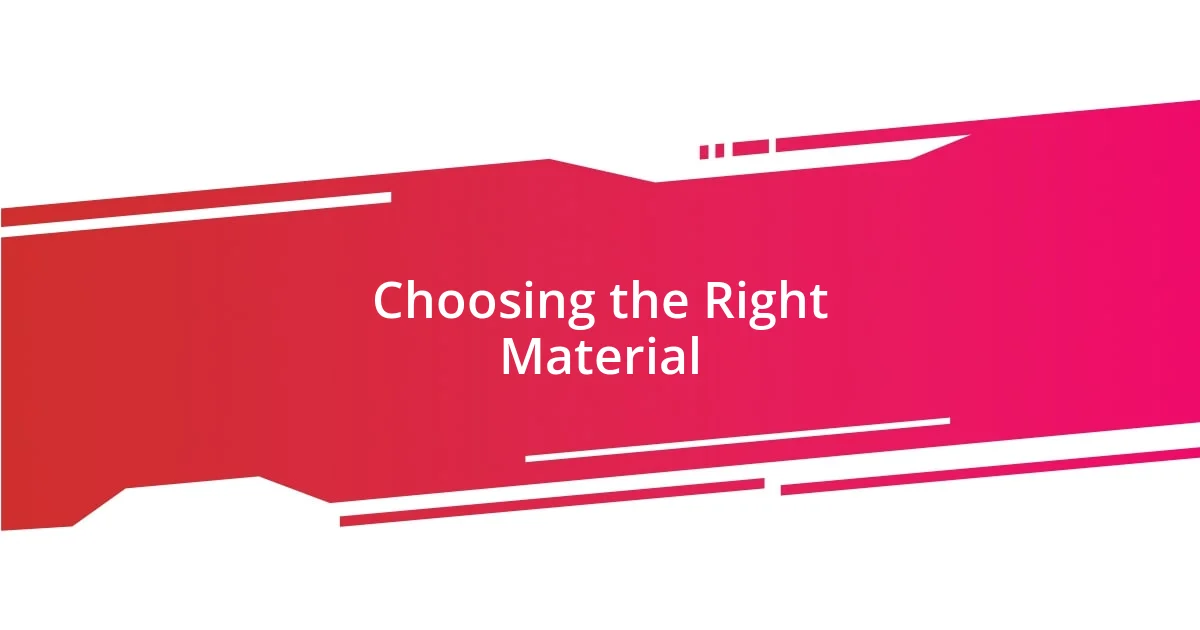
Choosing the Right Material
Choosing the right material for your performance is crucial. When I think back to my early days, I remember how I anxiously sifted through my favorite songs, searching for the one that would truly resonate with me. Now, I realize that choosing material that showcases your unique voice and style can elevate your performance significantly. Have you ever felt the difference between singing a song you love and one you don’t? That passion can be palpable!
When selecting your pieces, consider the audience and the vibe of the night. I made the mistake once of performing a deep, introspective poem at a lively comedy night; the disconnect was almost palpable. It taught me that understanding the context of the event is just as important as the content of your material. So, ask yourself: What mood do you want to evoke? That’s how you can align your choice with the energy in the room.
Lastly, personal stories can create powerful connections with the audience. I once shared a heartfelt anecdote about my childhood while performing a song, and it transformed my set. The crowd felt my emotion and responded with warmth. It’s moments like these that remind me why choosing the right material is more than just picking a title; it’s about sharing a piece of yourself in a way that captivates and connects.
| Material Type | Impact |
|---|---|
| Personal Stories | High connection; emotional impact |
| Popular Covers | Familiarity; audience engagement |
| Original Pieces | Showcase uniqueness; creativity |
| Humorous Content | Laughter; light atmosphere |
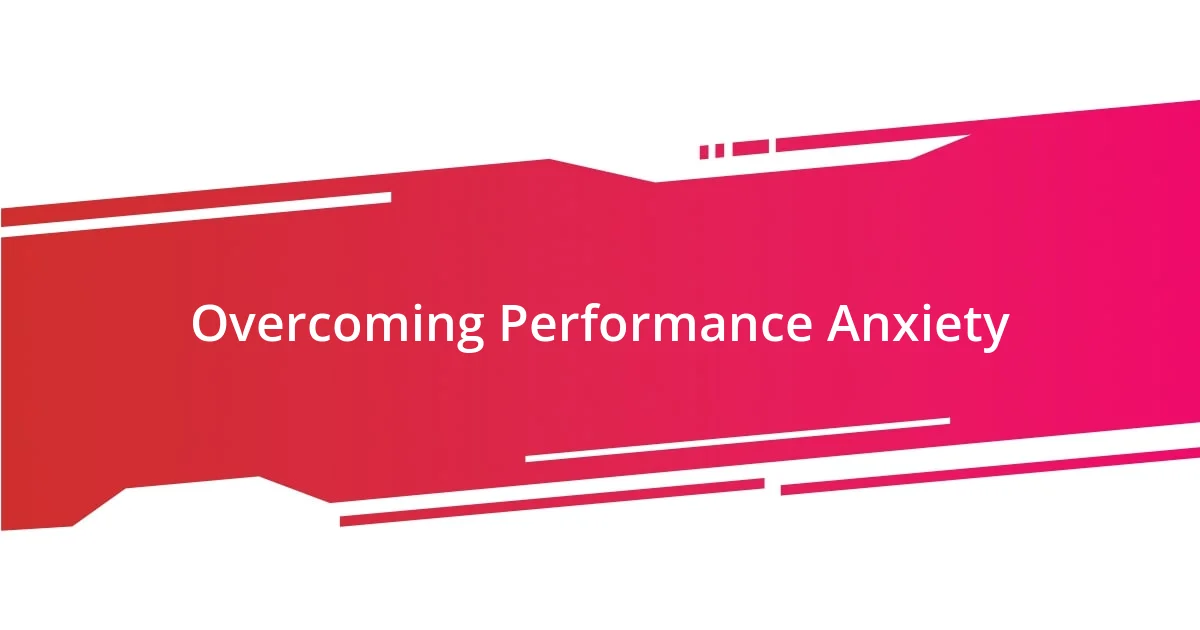
Overcoming Performance Anxiety
I still remember the first time I stood in front of an audience, my heart racing and palms sweaty. It felt like my mind was a chaotic whirlwind of “What ifs” and doubts. But I quickly learned that acknowledging my anxiety was the first step toward conquering it. Instead of trying to push those feelings away, I embraced them, turning that nervous energy into excitement. Have you ever noticed how that rush can transform your performance when you accept it instead of fighting it?
Another effective technique for me was grounding myself in the moment. I started focusing on my breath—slow, deep inhalations that calmed my racing thoughts. I would often set one foot slightly forward, anchoring myself while scanning the room as I connected with different faces. It’s amazing how that simple act can shift your focus from your worries to the people who are there to support you. How does getting grounded feel for you? Personally, it made all the difference, allowing me to share my music instead of being consumed by fear.
Soon, I discovered the power of community. After one particularly nerve-wracking performance, I talked to fellow artists about their experiences with anxiety. I realized that we all share that same rollercoaster ride of emotions before performing. Hearing their stories helped me feel less alone and encouraged me to be more open about my anxiety. Isn’t it comforting to know that others experience the same struggles? Together, we created a supportive atmosphere that not only eased our individual anxieties but also forged deeper connections among us.
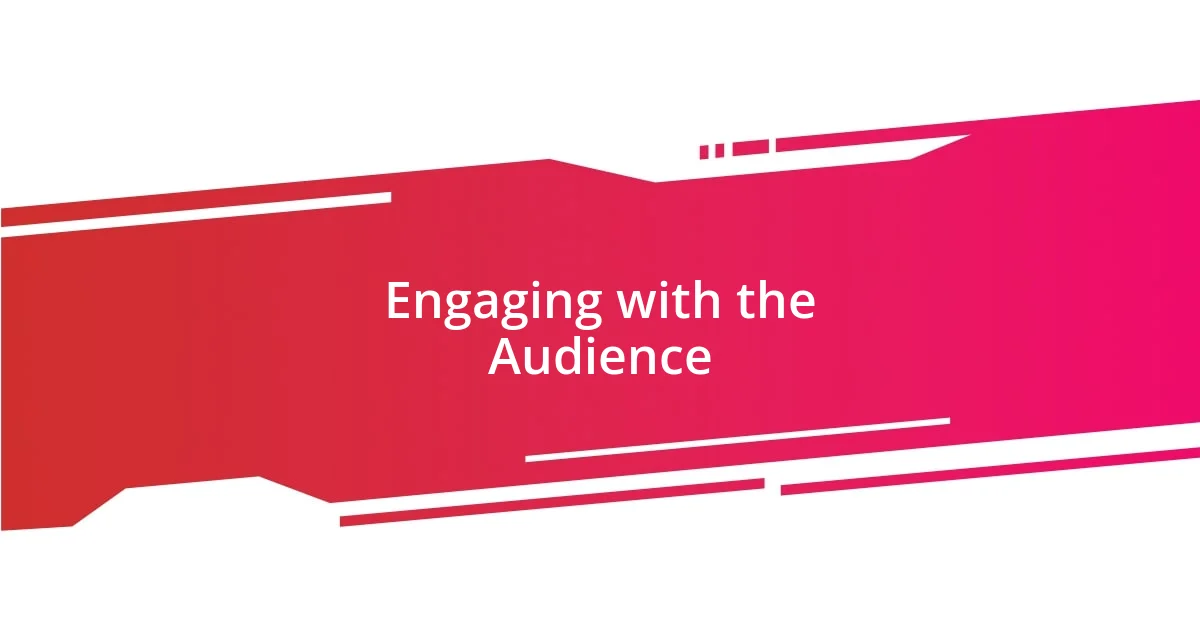
Engaging with the Audience
Engaging with the audience feels like magic when done right. I remember one night when I made an instant connection with a crowd by simply asking them about their favorite songs. Their eager responses fueled my energy, and in that moment, we weren’t just performer and audience; we were a collective experiencing music together. Have you ever felt that exhilarating blend of shared enthusiasm? It reminded me that the audience is not just there to watch—they’re there to connect.
It’s fascinating how a simple question or comment can transform the atmosphere. During a particularly quiet night, I decided to break the ice by sharing a light-hearted story about my own experiences with performance mishaps. The room erupted in laughter, shifting from tense to relaxed in an instant. This taught me that vulnerability breeds connection. Have you ever opened up and felt the shift in energy? That intimacy can elevate a performance beyond the music itself.
I’ve learned that improvisation plays a significant role in audience engagement too. One evening, when I noticed a few chatterboxes in the back, I jokingly invited them to join me on stage. Their playful banter turned into an unexpected duet, and the crowd loved every moment. It was spontaneous, unplanned, and utterly rewarding. Do you see how those unexpected moments can create lasting memories? They remind me that engaging with the audience is a dance, and sometimes, you just have to let the rhythm take control.
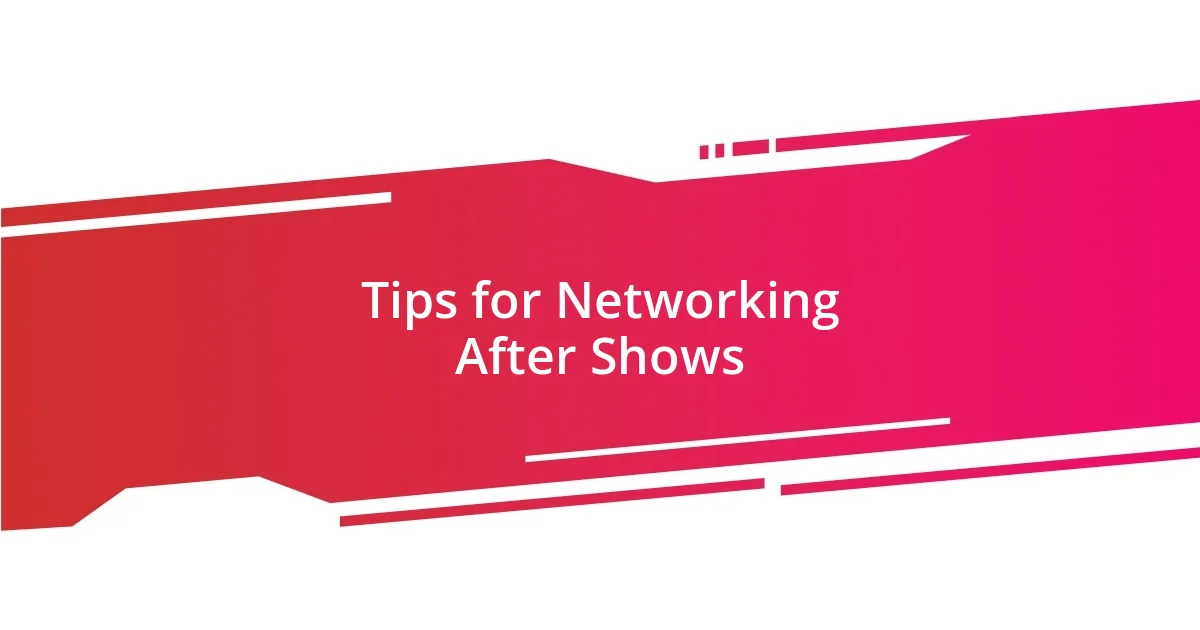
Tips for Networking After Shows
Networking after shows can truly amplify your experiences and connections in the music community. I always make it a point to approach fellow performers right after I finish my set. It was during one such encounter that I met someone who later became a key collaborator on my next project. Isn’t it fascinating how those chance meetings can lead to something beautiful?
I find that starting a conversation can be as simple as commenting on a shared experience from the night. For instance, I once approached an artist with whom I had similar nerves about performing that evening. Sharing that moment of vulnerability turned into a 30-minute conversation about techniques and inspirations we both had. Have you noticed how easy it is to bond over a shared passion?
Moreover, I always carry business cards or a quick way to share my social media handles. This became invaluable after one open mic night where I met a talent scout who wanted to see more of my work. Imagine if I hadn’t been prepared! It’s amazing how being ready can open doors that might have otherwise remained closed. How do you ensure you follow up with new acquaintances? I’ve learned that a simple email or message reminding them of our brief interaction can keep that connection alive.
